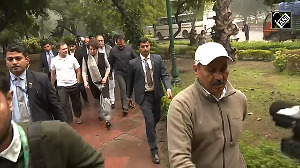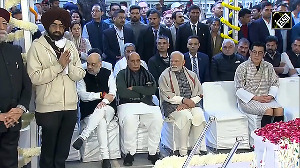Institute for Energy and Environmental Research president and leading technical expert on nuclear programs Dr Arjun Makhijani has said that he was aghast at the 'breadth of facilities' that India had put on the table for safeguards as it included 'fundamental physics and other research institutions.'
Coverage: Indo-US Nuclear Tango
Discussing with rediff.com the full text of India's nuclear separation plan that was tabled in Parliament last week, Makhijani said, "I really did not expect that institutions like the Tata Institute of Fundamental Research and other physics institutions will be put under permanent safeguards."
"This is very different from putting reactors under safeguards or even a reprocessing plant, because the reactor comes to the end of its life and then it is done. So permanent safeguards is only up to the end of its life," he explained.
India to know status of N-deal in Congress
"But research institutions truly should be a national permanent institution and to place that under permanent safeguards without the ability to withdraw it, is to subject the research institutions to political pressures in ways that may not be advisable," Makhijani said.
"The second point that is related to this is that if you look at the US agreement with the International Atomic Energy Agency, it is very different," he noted, adding, "The US can add or withdraw facilities at will, and so, because the Indo-US deal does not allow India to do that, once it puts research institutions under a permanent inspections umbrella, one does not know exactly what the status of that research would be."
N-deal: There are still some issues, says US
"Also, who could use the research, what all material India would have to make available freely to international institutions, what might happen to ideas that originate in India and their status, and who could take advantage of them," he queried.
"I am not for nuclear weapons, but I think that countries should be dealing with the IAEA on an equal basis. I mean this is not an agreement that will allow India to be on an equal basis with the other nuclear weapons states," Makhijani said.
Nuclear Dream Team to meet again
"I am still not in favor of this (Indo-US) agreement, essentially because it will make India vulnerable," he said, noting that the text of the separation plan tabled in Parliament validated the argument that he had been making against the deal.
"If there is any IAEA judgment that India has not complied fully with, then India would be subject to a lot of political pressures for cut off of nuclear fuel supplies. In such a scenario, since India has almost no uranium resources and is expanding its nuclear power, this would make India very vulnerable to US political pressure. The whole foreign policy of the country would be subject to essentially what happens in Washington, much more than it is today, and I do not think that is a desirable thing," Makhijani said.
Onus of Congress nod to Indo-US N-deal on US admin
He said in such a situation, it could come to the kind of political and diplomatic pressure that is currently being applied on Iran led by the US, which wants the international community to coalesce with it in isolating Tehran.
"It could come to that because the US and India are both democracies and their primary constituencies have to be internal, and so if a day comes when India does not agree with the United States on some big issue, as for instance, where it gets its natural gas supplies or how it gets its natural gas supplies, then there could be serious repercussions," he said.
Boucher urges Congress to approve Indo-US N-deal
Makhijani said: "Today, it is alright because there are only two reactors involved in import of fuel. But in the future if there are 10,20 or 30 reactors, the whole Indian industrial sector and the electricity sector could be jeopardized because of disagreements."
"So this is confirmation somewhat of the unequal partnership that India is entering into with the United States," he said.






 © 2024 Rediff.com -
© 2024 Rediff.com -